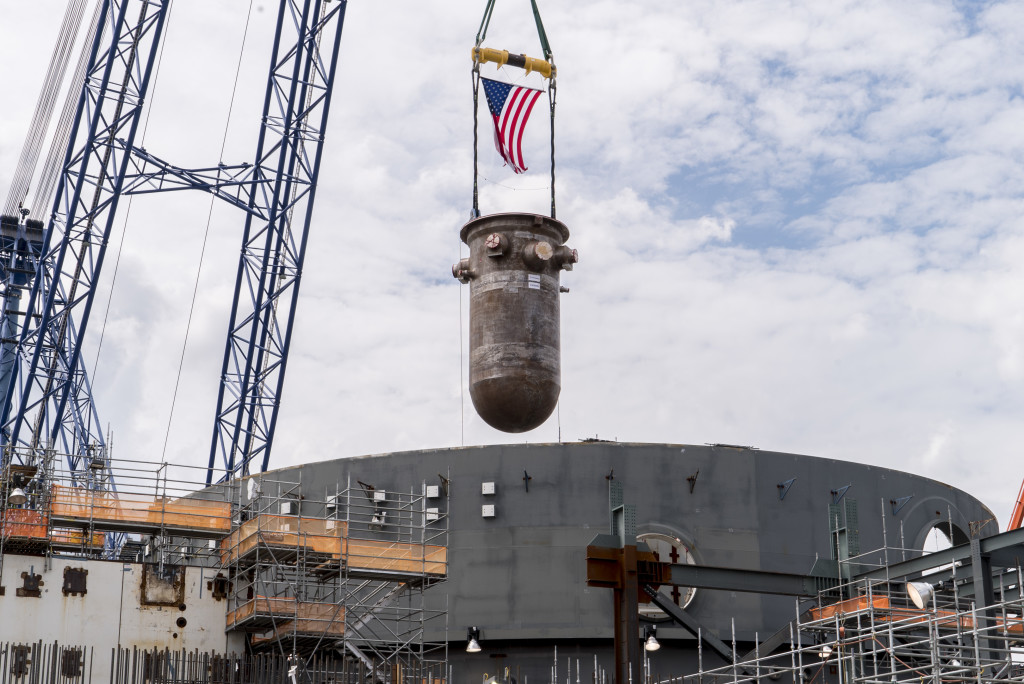A South Carolina government report touting the strong fiscal future of SCANA – the crony capitalist utility at the heart of an ongoing corporate implosion – is facing fresh scrutiny this week.
Earlier this month the S.C. Office of Regulatory Staff (SCORS) issued a report suggesting a rosy outcome for the Cayce, S.C.-based firm – which partnered with government-run utility Santee Cooper on a spectacularly failed, colossally costly nuclear power plant expansion (a.k.a. #NukeGate). Shortly thereafter an independent analysis was released contradicting the claims contained in the government report.
Now SCANA is weighing in on the matter directly, accusing SCORS of committing a “fundamental accounting error” in its analysis – an error the agency “has made no attempt to correct.”
“Instead (the agency) has remained silent even after being informed of its accounting error,” a letter from SCANA’s top attorney Chad Burgess alleged.
Them’s fightin’ words, people …
According to Burgess’ letter (.pdf), an executive director at London-based professional services firm Ernst & Young has submitted an affidavit alleging that SCORS has “incorrectly interpreted and misapplied Generally Accepted Accounting Principles in reaching (its) conclusions.”
Specifically, Ernst and Young executive director Angela Nagy argued in her affidavit that SCORS is vastly understating the impact of state lawmakers repealing the now notorious Base Load Review Act (BLRA) – an insidious piece of special interest legislation that allowed SCANA and Santee Cooper to socialize the investment risk associated with the botched nuclear project.
(Click to view)

(Via: Provided)
Advanced by “Republican” lawmakers and allowed to become law in 2007 by former governor Mark Sanford, the BLRA enabled SCANA and Santee Cooper to bill ratepayers for the costs of constructing the reactors. In fact ratepayers are still being billed to the tune of $37 million a month – even though it’s highly unlikely the project will ever be completed.
Repeal of the BLRA – which is reportedly scheduled to be taken up by a S.C. House committee this week – is supported by many lawmakers and was belatedly endorsed last week by governor Henry McMaster.
McMaster’s endorsement was viewed as a flip-flop, however, because he previously touted the purchase of SCANA by Virginia-based Dominion Energy. Dominion’s deal for the embattled utility would be off the table in the event the legislation is repealed.
What made McMaster flip-flop? Political pressure – particularly the grilling he was receiving on the issue from Lowcountry labor attorney Catherine Templeton, who is mounting a surprisingly credible challenge against him for the GOP gubernatorial nomination this spring.
According to SCORS, there is a 35 percent chance SCANA will go bankrupt if the BLRA is repealed. Critics of the agency – which failed miserably in its role as a watchdog over this project – argue the likelihood of a bankruptcy is much higher, especially if the law’s repeal spawns a protracted legal battle.
The affidavit obtained by SCANA would seem to support the latter view.
How did we get here?
To recap: With state lawmakers cheering them on, SCANA and Santee Cooper spent the past decade building a pair of next-generation nuclear reactors in Jenkinsville, S.C. at a cost of $9.8 billion. The money was spent, but the reactors were never finished. In fact they’re not even half-finished – with the cost to complete them reportedly ranging from anywhere between $9-16 billion.
As of this writing, there are no plans to complete the project ….
[timed-content-server show=”2018-Jan-17 00:00:00″ hide=”2018-May-18 00:00:00″]
SPONSORED CONTENT (ARTICLE CONTINUES BELOW)
[/timed-content-server]
Drowning in debt, Santee Cooper pulled the plug on the reactors six months ago – killing an estimated 5,600 jobs, squandering billions of dollars in investment and throwing the state’s energy future into chaos.
Just eight days before it bailed on the project, the state-owned power company announced massive rate increases on customers tied to “costs associated with nuclear construction and other system improvements.” The utility has also given its former leader a multimillion-dollar, taxpayer-subsidized golden parachute – even though documents released last summer showed its executives (and SCANA’s leaders) knew two years ago that the project was doomed.
No wonder people are furious …
Not surprisingly, #NukeGate has prompted a flood of lawsuits and a rapidly escalating, multi-jurisdictional criminal probe in addition to its ongoing political fallout.
Our view? First and foremost, this whole debacle is a case study of what happens when government injects itself in speculative economic development (or, in the case of Santee Cooper, when it tries to run a business).
Neither are core functions of government, people.
This investment risk never should have been socialized. And had Santee Cooper been sold when we recommended it nearly a decade ago, it would have fetched billions for taxpayers.
Now the state will be lucky to get rid of it …
As we’ve stated from the beginning of this mess, we don’t trust the politicians who created this disaster to get us out of it. At all. Nor do we believe they are acting in the best interests of ratepayers now.
They are posturing … pure and simple. Hoping the public will forget that their fingerprints are all over this disaster.
Hopefully a deal will be reached sooner rather than later that avoids a protracted legal battle over SCANA and Santee Cooper’s future – a battle that could conceivably cripple the state’s economic viability for years to come and destroy its credibility in the bond markets.
That’s the worst-case scenario here: A bitter legal fight that hamstrings economic growth, ruins our state’s already deteriorating reputation with the financial markets and still leaves ratepayers with nothing.
Unfortunately, that may be where we are headed.
“Our goal is simple: A reasonable settlement that maximizes ratepayer relief, within the confines of what the courts will accept and the markets will bear,” we wrote last week.
Is that on the table at the moment? No, it is not. But we’re still hopeful we can get there …
***
WANNA SOUND OFF?
Got something you’d like to say in response to one of our stories? Please feel free to submit your own guest column or letter to the editor via-email HERE. Got a tip for us? CLICK HERE. Got a technical question or a glitch to report? CLICK HERE. Want to support what we’re doing? SUBSCRIBE HERE.
Banner: iStock
